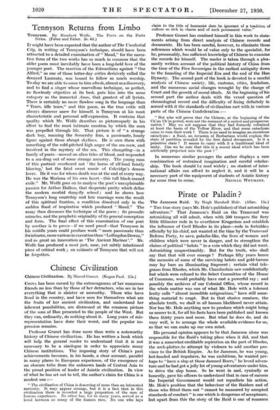Chinese Civilization
Chinese Civilization. By Marcel Granet. (Kogan Paul. 25s.)
Cin-Na. has been cursed by the extravagances of her numerous friends no less than by those of her detractors, who see in her everything that is sinister or unworthy. Those who have lived in the country, and have seen for themselves what are the fruits of her ancient civilization, and understand her inherent possibilities, are distressed at the common picture of the sons of Han presented to the people of the West. But they can, ordinarily, do nothing about it. Long years of mis- representation have done their worst, and the popular im- pression remains.
Professor Granet has done more than write a noteworthy history of Chinese civilization. He has written a book which will help the general reader to understand that it is not necessary to be a sinologue in order to appreciate many Chinese institutions. The imposing story of China's past achievements becomes, in his hands, a clear account, parallel in many places to European experience, of the emergence of an obscure tribe from the unknown lands of Central Asia to the proud position of leader of Asiatic civilization. In view of what he has set out to tell, the author's claim for China is a modest one :— " The civilization of China is deserving of more than an interested curiosity. It may appear strange, but it is a fact that in this civilization there is recorded a large proportion of tho sum of human experience. No other has, for so many years, served as a bond between so many of the human race. No one who lays claim to the title of humanist dare be ignorant of a tradition of culture so rich in charm and of such permanent value."
Professor Granet has confined himself in this work to state- ments arising from direct analysis of Chinese records and documents. He has been careful, however, to eliminate those references which would be of value only to the specialist, for he, presumably, has sufficient knowledge of Chinese to examine the records for himself. The reader is taken through a plea- santly written account of the political history of China from the time of the Five Sovereigns in the earliest antiquity down to the founding of the Imperial Era and the end of the Han Dynasty. The second part of the book is devoted to a careful analysis of Chinese society, life, customs, cities, feudalism, and the numerous social changes wrought by the change of Court and the growth of moral ideals. At the beginning of his second part the author deals with the vexed question of chronological record and the difficulty of fixing definitely in accord with it the standards of civilization met with in various parts of the Chinese Confederation :— " But who will prove that the Chinese, at the beginning of the Ch'un Ch'iu period, were not the remnant of a united and prosperous nation ? May we not suppose that they had formerly colonized at least the basin of the Yellow River, and that some cataclysm came to ruin their work 7 There is no need to imagine an enormous cataclysm a flood, an invasion of Barbarians would explain the state of partition revealed by the first dated documents. Is it a primitive state 7 It seems to carry with it a traditional ideal of unity. Can we be sure that this is a recent ideal which has been artificially projected into the past ? "
In numerous similar passages the author displays a rare combination of restrained imagination and careful scholar- ship. The book should ke read widely ; no student of inter- national affairs can afford to neglect it, and it will be a necessary part of the equipment of students of Asiatic history


































 Previous page
Previous page